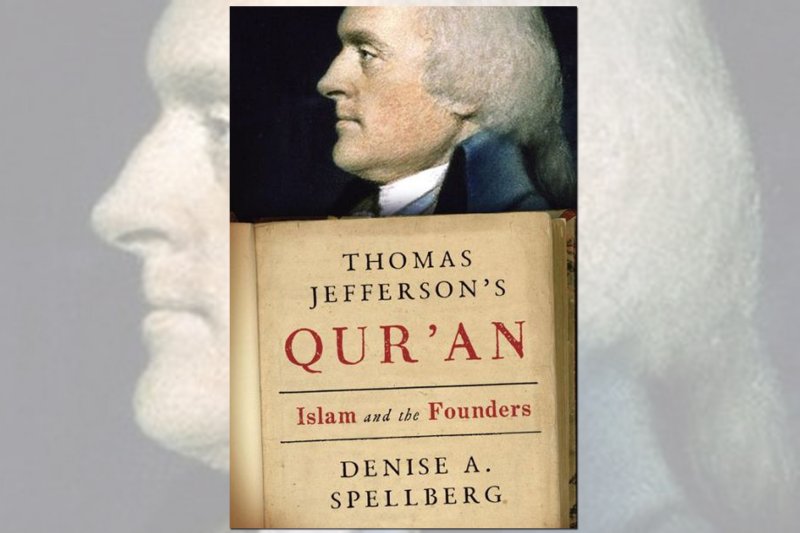
Thomas Jefferson’s Qur’an: Islam and the Founders. By Denise A Spellberg. New York: Alfred A. Knopf. Pp392. HB. 2013. $27.95
The fact that Islam, its Prophet and the Qur’an had been misinterpreted and misrepresented in the Western world since the birth of that faith in the seventh century Arabia, is common knowledge today. However, the extent of the ignorance and misunderstanding that prevailed at the time is not always fully understood or appreciated. That prompted many prominent and some not-so well-known westerners to take their own initiatives to acquire a better and more informed understanding of Islam, its Prophet and the Qur’an.
For example, dismayed by the level of prejudice and misinformation that existed about Islam in nineteenth century England, in 1829, Geoffrey Higgins (d 1833) felt compelled to write a book titled An Apology for the Life and Character of the Prophet Mohamed, which consisted of 109 pages. Published in London by Rowland Hunter in the same year, the author dedicated the book to the members of the Asiatic Society of Great Britain and Ireland with these words: ‘To you, my Lords and Gentlemen, I take the liberty of dedicating this small Tract, because I am desirous of correcting what appear to me to be the erroneous opinions which some of the individuals of your Society (as well as others of my countrymen) entertain respecting the religion of many millions of the inhabitants of the Oriental Countries, about the welfare of whom you meritoriously interest yourselves; and, because a right understanding of their religion, by you, is of the first importance to their welfare…’ (p v)
Spearheaded by scholars and writers like Edward Pococke (d. 1691) and Henry Stubbe (d. 1697), the case for a balanced and accurate understanding of Islam, its Prophet and the Qur’an was subsequently made by John Davenport (d. 1877), the author of An Apology for Mohammed and the Koran (1882) and Geoffrey Higgins, among others, in nineteenth century England. What was it like in America at the time?
According to the author of the book under review, ‘At a time when most Americans were uninformed, misinformed, or simply afraid of Islam, Thomas Jefferson imagined Muslims as future citizens of his new nation. His engagement with the faith began with the purchase of a Qur’an eleven years before he wrote the Declaration of Independence. Jefferson’s Qur’an survives still in the Library of Congress, serving as a symbol of his and early America’s complex relationship with Islam and its adherents. That relationship remains of signal importance to this day.’ (p3)
An Associate Professor of history and Middle Eastern studies at the University of Texas, Denise Spellberg argues that Jefferson’s interest in Islam in general and the Qur’an in particular was generated, thanks to the influence of the prominent English philosopher John Locke (d 1704), who was well acquainted with aspects of Islamic philosophy and thought, and he advocated the need for the toleration of Muslims, Jews and other minorities. However, his detractors not only misunderstood him but they also accused Locke and Jefferson of professing the faith of a ‘Turk’ or being ‘half a Musulman’. (p271)
Consisting of seven detailed chapters, an introduction and afterword, in this book the author provides an interesting and informative study of America’s relationship with Islam from the beginning of its history up to contemporary times, focusing particularly on the lives and contribution of its founding fathers, namely Thomas Jefferson (d 1826), John Adams (d 1826) and James Madison (d 1836). Others who advocated the rights of Muslims as citizens of an inclusive and pluralistic American society at the time included prominent lawyers such as James Iredell (d 1799) and Samuel Johnston (d 1816), and Christian preachers like John Leland (d 1841).
The author, to her credit, has also shed light on the lives of early American Muslims like Abd al-Rahman Ibrahim ibn Sori (d cir. 1827) and Umar ibn Sa’id (d 1864), for ‘they remind us of the presence of tens of thousands of Muslim slaves who had no rights, no voice, and no hope of American citizenship in the midst of these early discussions about religious and political equality for future, free practitioners of Islam.’ (p10)
Although the founding fathers championed a democratic, inclusive and pluralistic vision for America, putting that vision into practice proved to be more challenging and painful than anticipated so much so that the Jews and Catholics struggled to gain equal rights as citizens of America well into the twentieth century, not to mention the African Americans. Prejudice against these groups has persisted to this day although, as the author rightly points out, “Only Muslims remain the objects of a substantial civic discourse of derision and marginalization, still being perceived in many quarters as not fully American.” (p11)
The author hopes that this book will help provide the historical context to the Muslim presence in America at a time when their place and position in society is being hotly contested, not unlike in many Europe countries, I hasten to add. Meticulously researched, fully referenced and highly readable, the author of this book deserves much credit for this important, informative and timely contribution; recommended reading for Americans and others, Muslims and non-Muslims alike.
Muhammad Khan, author of The Muslim 100 (2008) and The Muslim Heritage of Bengal (2013)